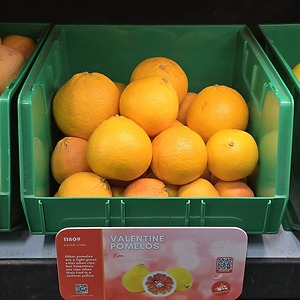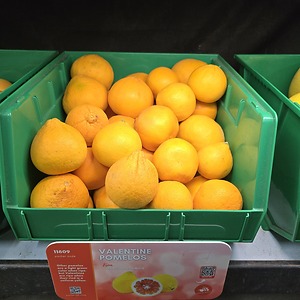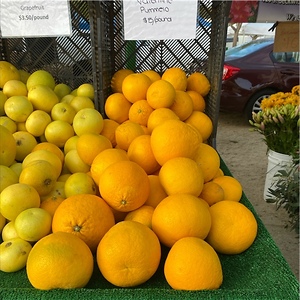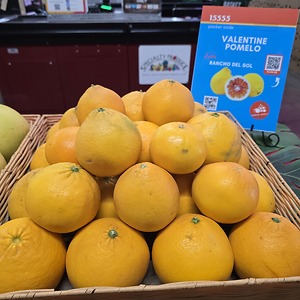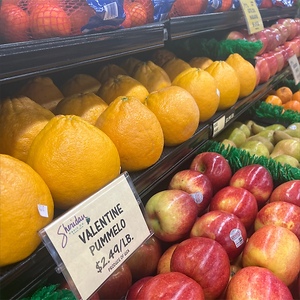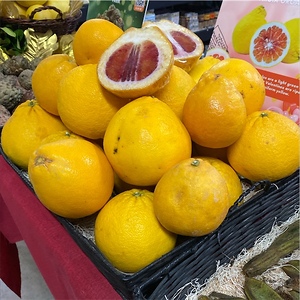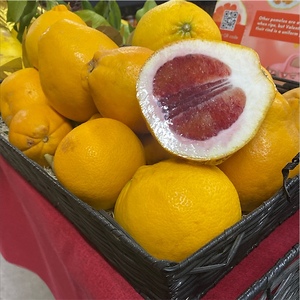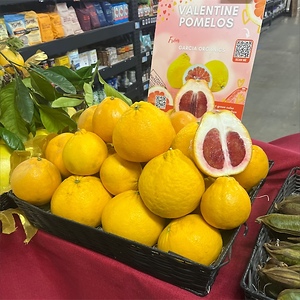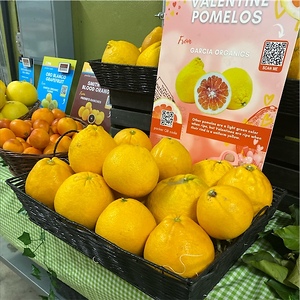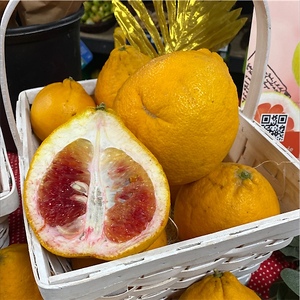


Valentine Pomelos
Estimated Inventory, lb : 0
This item was last sold on : 03/09/25
Description/Taste
Valentine pomelos vary in size and shape, depending on growing conditions, but are generally a smaller variety, averaging around 15 to 20 centimeters in diameter. The fruits have a round to pyriform shape with a bulbous, curved nature. Some fruits exhibit a pronounced neck on the stem end, but it is worth noting that not all fruits will have this distinct feature. Valentine pomelos are ripened to uniform shades of golden to dark yellow, and the rind is textured, taut, and covered in sunken oil glands, giving the surface a pebbled feel. The rind is easy to peel and remove, revealing a thick layer of spongy white pith. This pith encases golden flesh pigmented with red, purple-red, and dark red tones. Each Valentine pomelo will vary in its degree of pigmentation, and some will have more coloring than others. Growing conditions and exposure to cooler temperatures largely determine pigmentation. The flesh is divided into 12 to 14 segments by thick membranes and notably has large and firm juice vesicles that can be separated into individual pieces. The flesh is aqueous, crisp, and succulent, encasing a moderate number of cream-colored seeds. Valentine pomelos are edible raw once ripe and have a sweet, subtly tart taste with faint berry and floral nuances. Some consumers also note a light bitterness to the flesh and comment that the flavor is primarily sweet but still balanced with low acidity.
Seasons/Availability
Valentine pomelos are available in the mid-winter through early spring. In Riverside, California, the variety’s site of origin, the fruits are in season between January and March, sometimes extending into April.
Current Facts
Valentine pomelos, botanically classified as Citrus maxima, are a hybrid variety belonging to the Rutaceae family. The pigmented cultivar was developed in Southern California in the mid-20th century from multiple types of citrus and was released in the early 21st century as a specialty fruit, favored for its easy-to-peel rind, sweet taste, and red-colored flesh. Valentine pomelos are slightly smaller than other pomelo varieties. They also inherited distinct characteristics from their mandarin, blood orange, and pomelo lineage, distinguishing them from commercial pomelos available in markets. The variety is known for its rich pigmentation, created by anthocyanins, increasing the fruits’ aesthetic appeal, nutritional value, and marketing appeal. In the modern day, Valentine pomelos have remained a specialized variety mainly grown in the United States and are sometimes nicknamed Blood pomelos among growers in California. The fruits are seasonally offered as premium citrus and are sold in markets for use in fresh and cooked culinary preparations. Valentine pomelos are also incorporated into a wide array of beverages.
Nutritional Value
Valentine pomelos have not been extensively studied for their nutritional properties. Pomelos, in general, are a source of fiber to regulate and stimulate the digestive tract and vitamins A, B6, and C, which help strengthen the immune system, maintain healthy organs, and aid in overall brain development. Pomelos also provide minerals, including potassium, copper, magnesium, iron, and calcium. Potassium helps the body balance fluid levels and replenish electrolytes, while copper assists in producing red blood cells. Magnesium helps control daily nerve functions, iron develops the protein hemoglobin for oxygen transport through the bloodstream, and calcium supports bones and teeth. Other nutrients include riboflavin and thiamine. Valentine pomelo’s pigmented flesh and juice indicate the presence of anthocyanins, natural compounds with antioxidant properties to reduce inflammation and protect the cells against damage caused by free radicals.
Applications
Valentine pomelos have a sweet and subtly tart flavor suited for fresh and cooked preparations. The variety is favored for its pigmented coloring and low-acid flesh, allowing it to add visual appeal and sweet nuances to culinary dishes. Valentine pomelos are most commonly peeled into segments and consumed as a snack. The rind is easy to remove, and consumers can choose whether or not they want to eat the flesh with the membranes intact or peeled. It is important to note that the membranes may add a slightly bitter flavor, and most consumers prefer removing them before eating. Valentine pomelos can also be sliced in half at its diameter, and the flesh scooped with a spoon, similar to eating grapefruit. Fresh pomelo segments can be sprinkled with salt or chili powder for added flavoring or dipped into soy sauce for a sweet and salty taste. The segments can also be separated into juice vesicles and sprinkled over salads or main dishes as an edible topping. In California, Valentine pomelos are popularly added to fruit medleys and salads or used as a garnish over crepes and seasonal bowls. They are also incorporated into desserts as flavoring or sliced fresh over flan, cakes, Danishes, and other pastries. Try halving Valentine pomelos, brushing them in a simple syrup, and torching the surface to create a caramelized layer. Valentine pomelos can also be simmered into jams and jellies or infused into marinades, sauces, and vinaigrettes. The fruit’s rind is edible and is frequently candied into a sweet treat. In mixology, Valentine pomelos are juiced, and combined into cocktails, mocktails, matcha, or fruit juices. Cinnamon is often mixed into drinks to enhance the fruit’s sweet-tart taste. Valentine pomelos pair well with seafood such as tuna, shrimp, and swordfish, pork, nuts including pistachios, almonds, and pecans, herbs such as cilantro, mint, basil, fennel, and tarragon, and fruits including mangos, oranges, guavas, and coconut. Whole, unopened Valentine pomelos will keep for a few days at room temperature and for 1 to 2 weeks when stored in the refrigerator.
Ethnic/Cultural Info
Valentine pomelos acquired their moniker after a nickname given by an employee of the Citrus Variety Collection at the University of California at Riverside. Staff Research Associate Ottillia ‘Toots” Bier gave the variety its Valentine name for the fruit’s peak ripening period during the month of February. Valentine pomelos develop their highest concentration of pigmentation during the cold months of mid to late winter and are ready for harvest, generally close to or on Valentine’s Day. It has also been noted that Valentine pomelos sometimes feature red heart-shaped flesh when sliced in half from the top to the bottom. Once cut, the fruits are turned upside down with their stem-end facing down, and this positioning is what gives the flesh its heart-shaped appearance. Since their release, Valentine pomelos have become a choice fruit for celebrating Valentine’s Day in the United States. Their pigmented flesh shows shades of red, a color symbolizing love during the holiday, and is commonly paired with other pink and red culinary ingredients such as radicchio, pink chicory, strawberries, blood oranges, and edible flowers to create festive dishes.
Geography/History
Valentine pomelos were developed in the United States through breeders at the University of California at Riverside in Southern California. Initial crosses were performed in the 1950s, and the variety was created by breeding Siamese sweet pomelos with Dancy mandarins and Ruby blood oranges. One of the selections from this cross was a pigmented pomelo hybrid labeled 6C-28-18. This selection was not immediately released as other types, including Melogold and Oro Blanco grapefruit, were chosen for commercial debut. 6C-28-18 was saved within the breeding program, and it wasn’t until the 1970s that the selection was revisited. Drs. James Cameron and Robert Soost chose the hybrid fruit for possible cultivation in the late 20th century, and virus-free budwood sources were established in 1997 at the Lindcove Research and Extension Center in Exeter, California. The new variety was extensively trialed and evaluated in the early 2000s and was eventually released commercially in 2009 under the name Valentine. Today, Valentine pomelos are grown in commercial orchards as a fresh-eating fruit in the United States. The variety is mainly cultivated in California but has also been planted in smaller amounts in Arizona, New York, Massachusetts, Florida, and Hawaii. When in season, Valentine pomelos are sold through farmer’s markets, select supermarkets, and wholesalers. The variety is also sold through nurseries as a home garden tree.
Recipe Ideas
Recipes that include Valentine Pomelos. One
| Andrew Zimmern |
|
Pomelo Sorbet |
| Butter and Brioche |
|
Pink Pomelo and Rose Tarts with Honey Meringue |
| Cannelle et Vanille |
|
Pommelo, Raspberry and Corn Cake |
| the mom 100 |
|
Pitcher Pomelo Palomas |
Podcast



